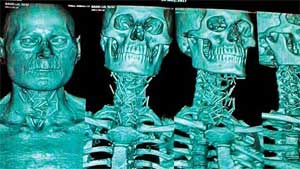- Home
- Editorial
- News
- Practice Guidelines
- Anesthesiology Guidelines
- Cancer Guidelines
- Cardiac Sciences Guidelines
- Critical Care Guidelines
- Dentistry Guidelines
- Dermatology Guidelines
- Diabetes and Endo Guidelines
- Diagnostics Guidelines
- ENT Guidelines
- Featured Practice Guidelines
- Gastroenterology Guidelines
- Geriatrics Guidelines
- Medicine Guidelines
- Nephrology Guidelines
- Neurosciences Guidelines
- Obs and Gynae Guidelines
- Ophthalmology Guidelines
- Orthopaedics Guidelines
- Paediatrics Guidelines
- Psychiatry Guidelines
- Pulmonology Guidelines
- Radiology Guidelines
- Surgery Guidelines
- Urology Guidelines
Whooping 91 pins removed from mans neck

In a bizarre case, a 56-year-old man from Rajasthan — who had 91 pins stuck inside his neck — was treated at a Delhi hospital, where doctors carefully picked out the pins and gave him a new lease of life.
Hailing from Rajasthan, Badrilal, an employee of Indian Railways, was mentally challenged, due to which he had swallowed more than 90 pins.
"In the last four months, he had lost too much weight as he couldn't swallow anything. He faced difficulties in eating. All the hospitals in our city refused to treat him," said Rajendra Meena, Badrilal's son.
After running from pillar to post, the family landed in Delhi after a relative suggested that they take the advice of a few experts there. The doctors at Asian Institute of Medical Sciences carried out a CT scan, where they found that he had more than 150 pins pierced in different parts of his body.
"At first, we carried out a CT scan besides an endoscopic procedure for proper diagnosis, and we were astonished to discover that he had more than 150 pins pierced in different parts of his body. A majority of the pins were pierced in the neck. The most challenging task was to remove those pins that were pierced in the vital nerves, arteries and organs, including the respiratory and food pipes, esophagus and the carotid artery (which supplies blood to our brain)," said Dr Lalit Mohan Parashar, Director, ENT, Asian Institute of Medical Sciences.
The entire surgical procedure took around six hours and the doctors were able to retrieve 91 pins from the neck of the patient, which posed the greatest threat to his life.
"We had to be extremely careful while removing the pins from the carotid artery and vocal cord as a small error would have led him to fall into a coma. The neck area is very complex as vital nerves pass through it. These nerves continuously supply blood to our brain and oxygen to other parts of the body. If the flow is disrupted, it can be fatal," said Dr Adil Rizwi, a cardiac surgeon from the hospital.
After the surgery, the doctors have advised him to be on a liquid diet for a few days. "This is unbelievable. We never thought that our father would be able to revive his taste buds again. We had seen him in so much pain. This is the best day of our life,' added Meena.

Disclaimer: This site is primarily intended for healthcare professionals. Any content/information on this website does not replace the advice of medical and/or health professionals and should not be construed as medical/diagnostic advice/endorsement or prescription. Use of this site is subject to our terms of use, privacy policy, advertisement policy. © 2020 Minerva Medical Treatment Pvt Ltd